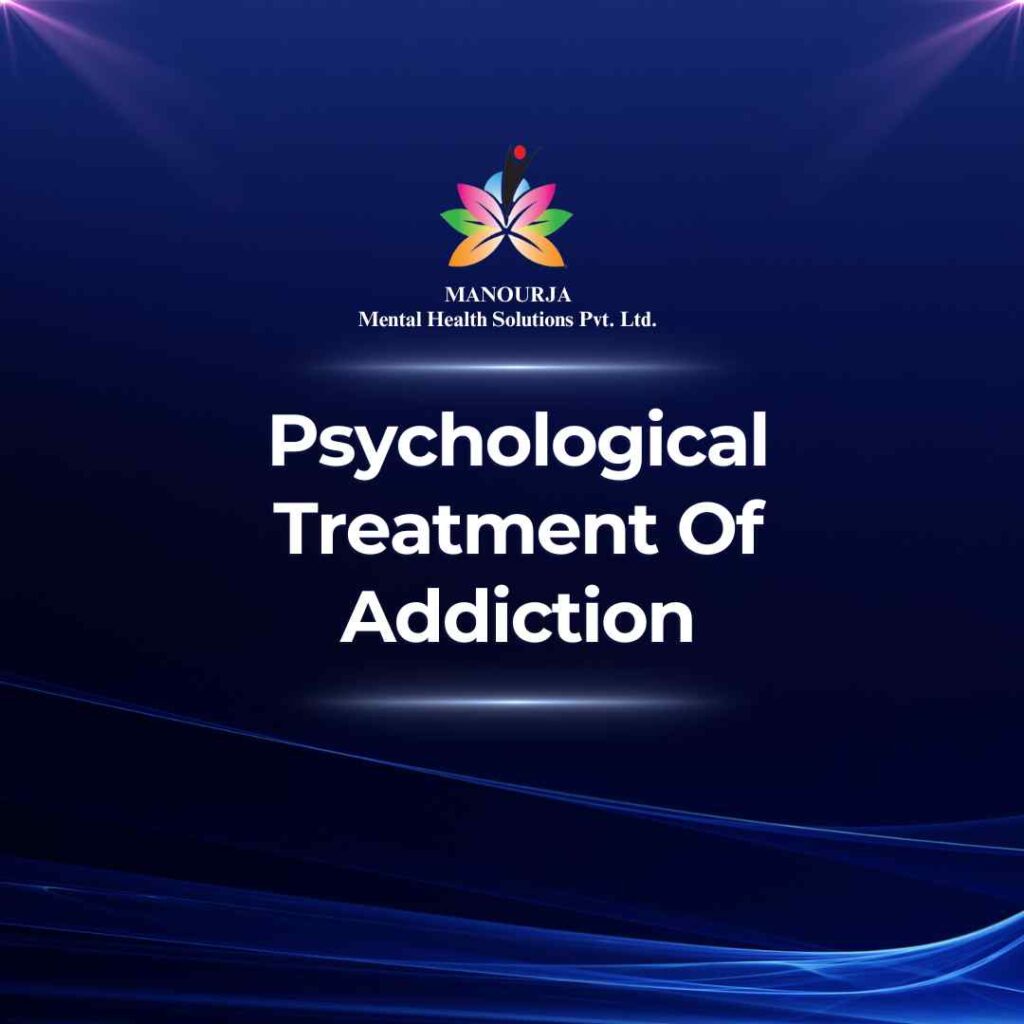Psychological Treatment for Addiction

Psychological treatment, also known as behavioral therapy, is a cornerstone in the comprehensive approach to addiction recovery. This form of therapy focuses on addressing the underlying thoughts, emotions, and behaviors associated with addictive patterns.
Here are key components of psychological treatment for addiction:
Cognitive-Behavioral Therapy (CBT)
- Goal: Identify and modify maladaptive thoughts and behaviors related to substance use.
- Techniques: Cognitive restructuring, identifying triggers, developing coping skills, and relapse prevention.
Motivational Interviewing (MI)
- Goal: Enhance an individual’s motivation to change by exploring and resolving ambivalence.
- Techniques: Open-ended questions, reflective listening, and affirmations to evoke self-motivation.
Contingency Management (CM)
- Goal: Reinforce positive behaviors and abstinence by providing tangible rewards.
- Techniques: Use of incentives or rewards for drug-free urine tests or meeting treatment goals.
Dialectical Behavior Therapy (DBT)
- Goal: Address emotional dysregulation and self-destructive behaviors associated with addiction.
- Techniques: Mindfulness, emotion regulation, distress tolerance, and interpersonal effectiveness.
12-Step Facilitation Therapy
- Goal: Align individuals with the principles of 12-step programs like Alcoholics Anonymous (AA) or Narcotics Anonymous (NA).
- Techniques: Encouraging attendance at meetings, working through the steps, and building a sober support network.
Rational Emotive Behavior Therapy (REBT)
- Goal: Challenge and change irrational beliefs and thought patterns contributing to addiction.
- Techniques: Identifying and disputing irrational beliefs, promoting rational thinking.
Mindfulness-Based Relapse Prevention (MBRP)
- Goal: Cultivate mindfulness skills to prevent relapse by increasing awareness of thoughts and emotions.
- Techniques: Mindful breathing, meditation, and acceptance of cravings without acting on them.
Family Therapy
- Goal: Address family dynamics and relationships affected by addiction, fostering a supportive environment.
- Techniques: Communication skills, education on addiction, and involving family members in the recovery process.
- Goal: Provide a supportive and empathetic group setting for individuals to share experiences and coping strategies.
- Techniques: Group discussions, skill-building exercises, and mutual support.
Holistic Therapies
- Goal: Incorporate complementary therapies such as art therapy, music therapy, yoga, or acupuncture to address the mind-body connection.
- Techniques: Engaging in creative expression, relaxation techniques, and alternative healing practices.
Trauma-Informed Therapy
- Goal: Address past trauma that may contribute to addiction and promote healing.
- Techniques: EMDR (Eye Movement Desensitization and Reprocessing), narrative therapy, and trauma-focused interventions.
Biofeedback and Neurofeedback
- Goal: Teach individuals to control physiological responses associated with stress and cravings.
- Techniques: Monitoring and regulating physiological indicators such as heart rate, skin conductance, or brainwave activity.
Psychological treatment is highly individualized, and the selection of therapy approaches depends on the unique needs and preferences of the individual seeking recovery. Effective psychological treatment empowers individuals to understand the root causes of their addiction, develop coping skills, and build a foundation for sustained recovery.
At MANOURJA, we believe in the transformative power of counseling. Our experienced therapists offer a safe and supportive space where you can explore your thoughts, emotions, and challenges. Through personalized counselling sessions, we’ll work together to develop coping strategies, build resilience, and achieve lasting positive change. Discover the path to a healthier, happier you with MANOURJA counselling services.
MANOURJA Rehabilitation Services
At MANOURJA, we’re dedicated to helping you in rebuild your life, after difficult times. Our rehabilitation services focus on understanding what you need to move forward, whether you’re recovering from addiction, trauma, or any psychological – social challenges. We create personalized plans, that are all about helping you, regain your strength and find hope again. With a caring team by your side, you’ll have the support to make real progress and take steps toward a brighter, healthier future
